Eat, grow, share: Communities building food resilience
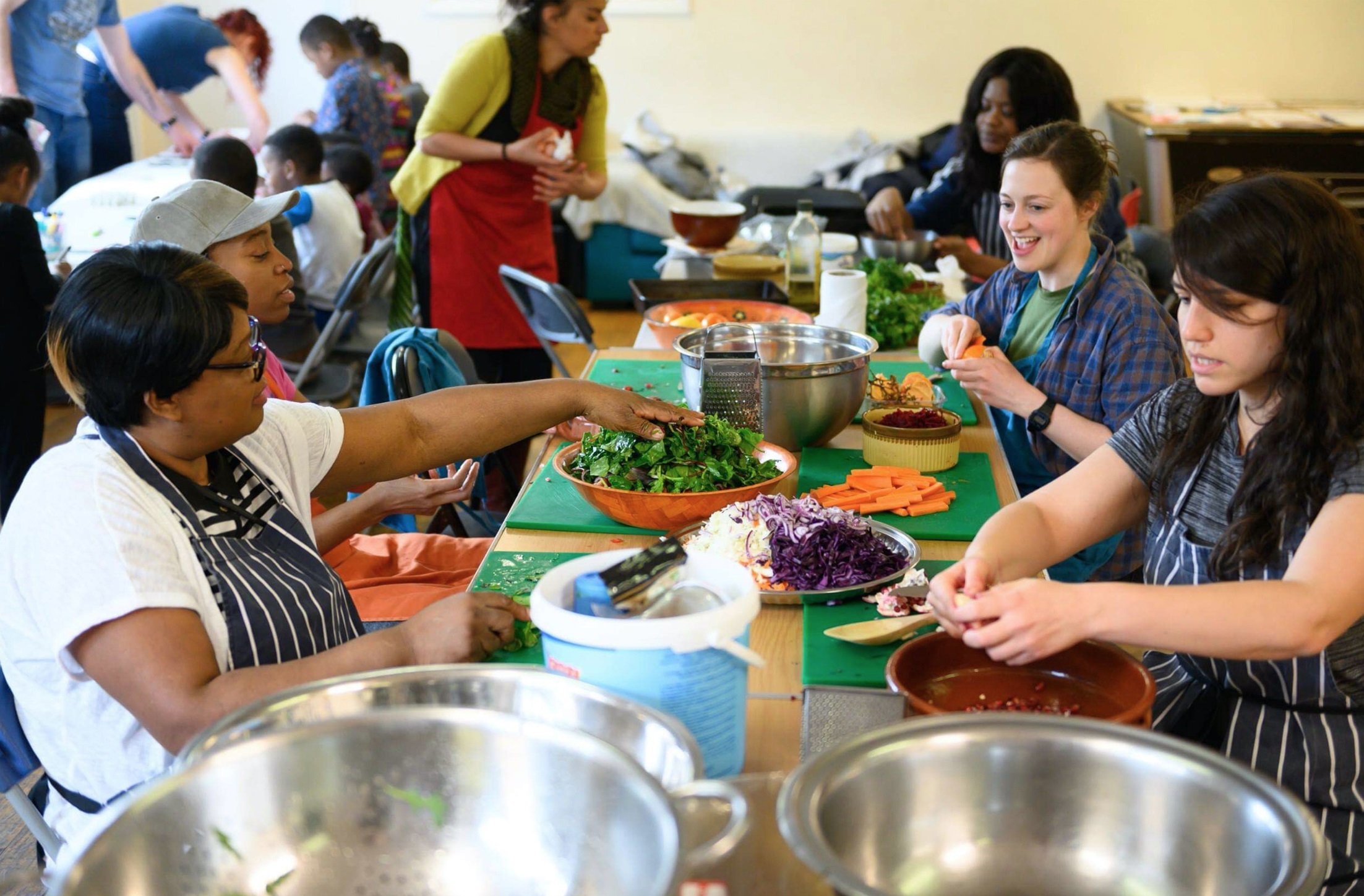
1 December 2022
12 minute read
Food can be a great social and cultural leveller. But as the cost of meeting this basic need rises fast for all, the impact is anything but level. Access to nutritious food is uneven and people’s resilience to price rises and scarcity varies massively.
Food campaigner and chef Jack Monroe highlighted how rising supermarket prices are not impacting all shoppers evenly. In January, they calculated some basic food items rose by over 300% while the official inflation rate was 5.4%. Meanwhile, the Food Foundation reported that those on the lowest incomes need to spend 47% of cash to meet the government’s healthy diet guidelines, compared with 11% for those with highest incomes.
This isn’t a “cost of living” crisis; it’s a cost of inequality crisis. It’s a cost of fossil fuel dependency crisis, with its knock on effects on transportation and resources for farm production. It’s a lack of food resilience crisis, in a country where food deserts already existed in low income communities and neighbourhoods. The pandemic, economic instability, war and global trade disruption are showing us all just how vulnerable the essential systems that we rely on really are. But in many places, communities are working towards reinventing local food systems, to ensure everyone can access fresh, healthy, quality food.
Opening access to food
Building resilient local communities is at the heart of Transition; and access to good quality, fresh food that is healthy, for people and planet, is a core element. For years, we have known that our food systems need reimagining, and groups have responded by developing projects that unlock access to local food, and help their communities withstand shocks.
Several Transition groups set up community fridges, including Zero Guildford, Leytonstone, Cloughmills, Stirling, Monmouth and Bro Gwaun. Many use existing public spaces, so they’re open through the week. Because the focus is on sharing surplus food, whether from shops, businesses or individual’s own kitchens or gardens, anyone can give or take food from a fridge. There are no obstacles such as referrals or meeting criteria.
Milly Carmichael from Transition Marlborough’s Community fridge said this is really important to serving the whole community: “Marlborough is a posh place. People think nobody is hungry here, so just having the community fridge project has enabled people to have the conversation that there is poverty in this town and we actually need to address that. But equally it’s been a leveller, because you don’t have to be in difficulty; anyone can come and use the fridge.”
Hubbub supports a network of 300 community fridges across the UK. Many develop other projects, growing food to share or cooking clubs, geared towards using the mixed bag of ingredients found in fridges.
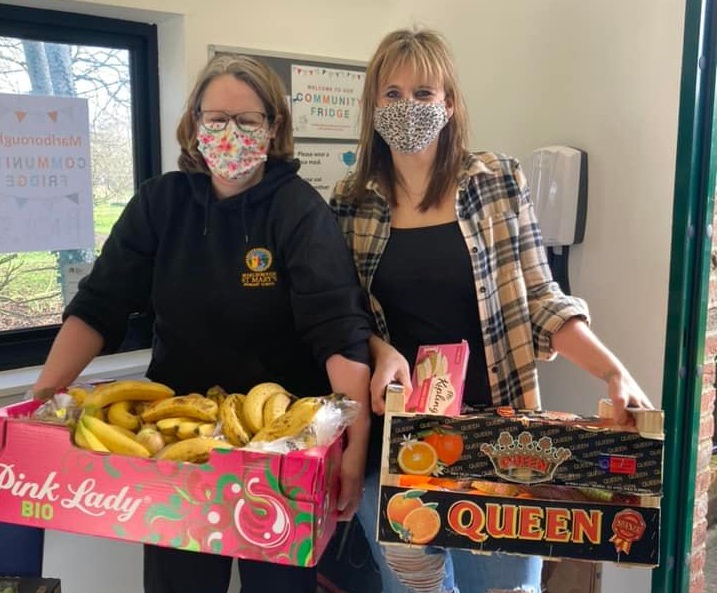
The twin challenges of rising food and energy prices make a disastrous mix, with many even using cooking appliances less. Transition Stroud wanted to help people address both challenges at the same time. They crowdfunded to make slow cooker packs – combining a low energy cooker with a cookbook, store cupboard ingredients and sociable chop and chat sessions, where people can swap tips and recipe ideas.
“It’s been incredibly successful,” said Adrian Oldman. “They’re very versatile, so you can make everything from Christmas cake to bread to yoghurt. It means you can take cheaper cuts of meat and slowly cook them.”
Adrian said it was vital to use the group’s existing networks, like the town’s food hubs to distribute the packs. The project has been a practical response and shown the link between everyday concerns and big environmental issues, said Adrian. “We were keen to reconnect to the very local and individual level, around the cost of living, energy consumption, good food and make it relevant.”
“Solidarity Not Charity”
Made Up Kitchen started out with ‘People’s Kitchen’ food waste feasts – anyone can turn up to cook and to eat joyful, vibrant, tasty meals. Check out their How To Guide here. When the pandemic struck, they joined with local youth organisation Rise 365 to cook meals using recipes from different cultures, and young people delivered them in their part of Hackney. After providing 40,000 meals they transformed into a more empowering social supermarket model, with the youth leaders managing many aspects of the operation.
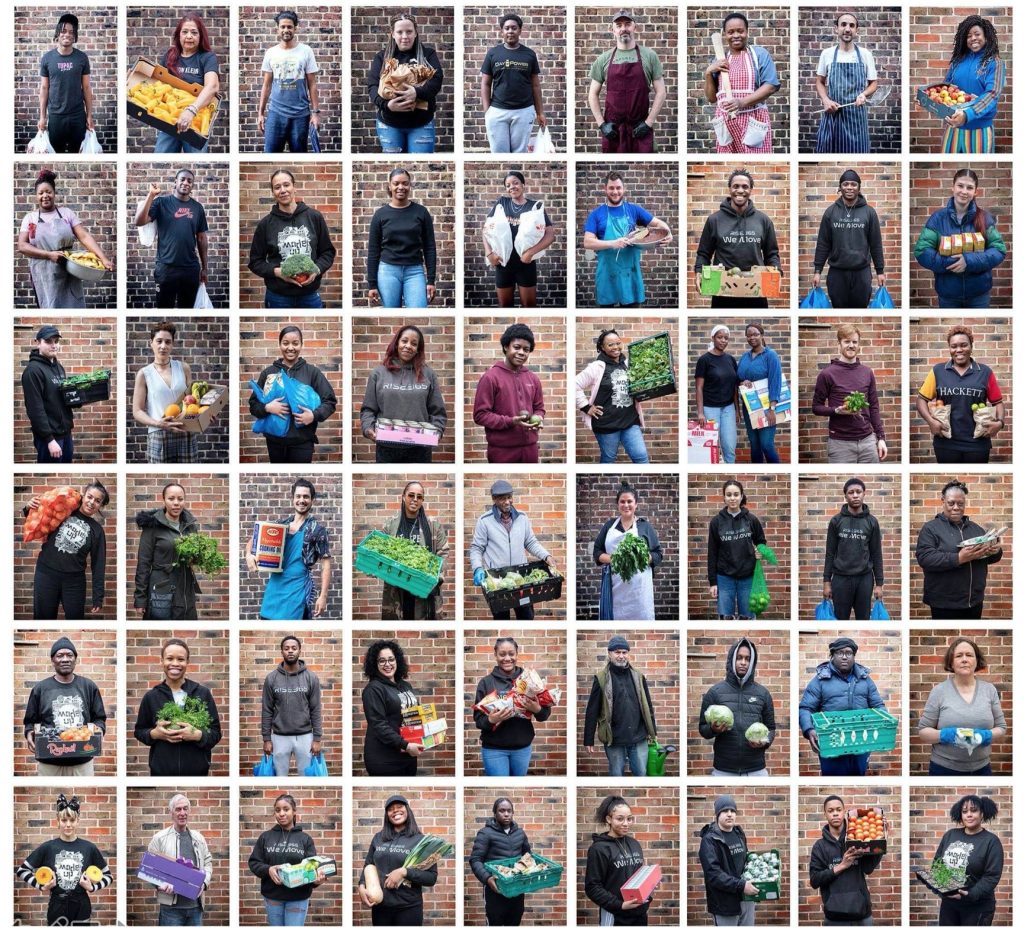
Founder Kiran Chahal said it was vital their response was by and of the community, bringing together all generations on equal terms. She said: “There’s usually this imbalance – one group of people get the opportunity to help, and another group are the people being helped. There’s a lack of equity. We need opportunities where people of all ages and those from diverse backgrounds can lead on providing support for our own communities. Authorities use words like being “vulnerable” or “disadvantaged” to describe individuals. We’re not that. It’s the system that’s at fault.”
Most grant funding for Kingsmead Community Shop ran out a year and a half ago, but it has continued to operate with crowdfunding, volunteer support, redistributing surplus food and with shoppers contributing. Kiran reflected: “Asking people to pay £8 for 7-8 bags of shopping is an empowering model because it enables everyone to play a part. It also allows us to slowly get to a point where we are self-sustaining because that’s what we want. We don’t want to be seen as providing ‘aid’, we want to create ‘change’.”
Food can be the fuel for wider changes and parent project Made Up Collective is exploring setting up a Community Pub and Café, where profits feed directly into wider Social Value projects. Kiran said: “Taking part in food projects isn’t as intimidating. And so, once you get people cooking or food shopping, then asking them to exercise, socialise together or to join in on other community activities is easier.”
Another way that communities are increasing access to affordable food is by combining their buying power. Cooperation Town supports residents of streets and estates to come together to set up neighbourhood level food coops. Unlike a food bank, where participants are referred and often passive recipients of parcels they didn’t select, these food co-ops are owned by their members, who make decisions. For Cooperation Town, it’s based on solidarity, not charity:
As founder Shiri Shalmy says in this short video: “Once you start organising with your neighbours you realise you have much more in common with them than needing to eat. And finding that working collectively around other issues is beneficial to everyone and that you are stronger together as a group.”
More room at the table
Food waste and lack of access to food are two massive problems of our food system and neither can solve the other. Yet rescuing food headed for the bin can support projects like these that share food. Whether individuals or groups, designing meals based on what’s available can be a creative, seasonal and affordable way to cook.
One place where the menu is often set in response to donated food is pop up community meals, such as Chesterfield’s monthly Waste Not Cafe. There is something very grounding and joyful about eating together. When people can contribute their time and skills to help cook or pay as they can, that opens it up to everyone.
Food in Community, which emerged from Transition Town Totnes, organises pop up meals as one of their many outlets for food rescued from local farms and shops, as well as distributing veg boxes to individuals and local community groups. But the community meals are about more than just distributing food – it’s about binding the community together. One of the organisers said: “People tell us they love that the cafe is for everyone, not just a facility for people in crisis.”
Some have moved beyond pop up events to become community cafes, run on a not-for-profit basis or as co-ops. It can be challenging to cover rent and have enough hands to keep the doors open – many are run completely or partly by volunteers and use surplus food to keep costs down.
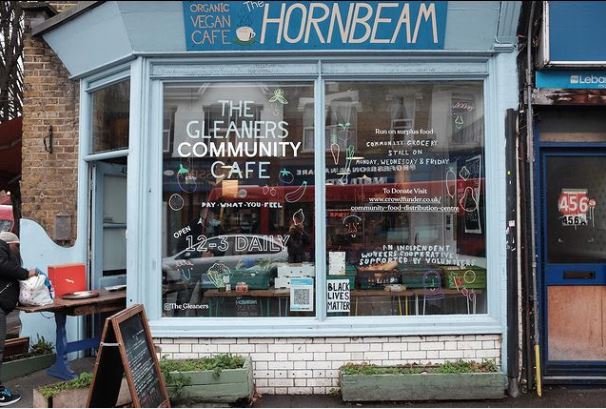
Examples include The Dock pay-as-you-feel cafe in Belfast, Exeter’s Sidwell Street Cafe, the Bank Cafe, Chopwell in rural Gateshead, and a network inspired by the Real Junk Food Cafe across the Midlands and beyond. The Gleaners Cafe has a sliding scale price list and invites people to sign up to regular orders of granola, cake and meals to balance sustainability for the project with being accessible and affordable to the whole community. They say: “We work to promote a solidarity economy in Walthamstow Forest where rising house and land prices are driving up the cost of living, excluding many in our community from participating in both local cultural spaces and local economy.”
More hands in the soil
The challenge is not just about distributing food – at times it’s about sourcing it locally. Often there is unused land, just waiting for seeds to be planted – though access can be challenging. Some projects like garden or landshare schemes and Allot.Me match up individuals with space and those looking for land to grow, but there is much which communities can do together too.
Incredible Edible movement has raised the profile of guerilla growing of herbs, fruit and veg, available for anyone to harvest. Their motto is ‘if you eat, you’re in’ – and their beds are in spaces where anyone can pick a handful. Many Transition groups took up the shovel in places as varied as Appleby, Holmfirth, New Mills, Harborough, Lampeter and Southall in London. Now Incredible Edible is campaigning for a community Right to Grow on unused land, which could open up many more spaces and access to local food growing.
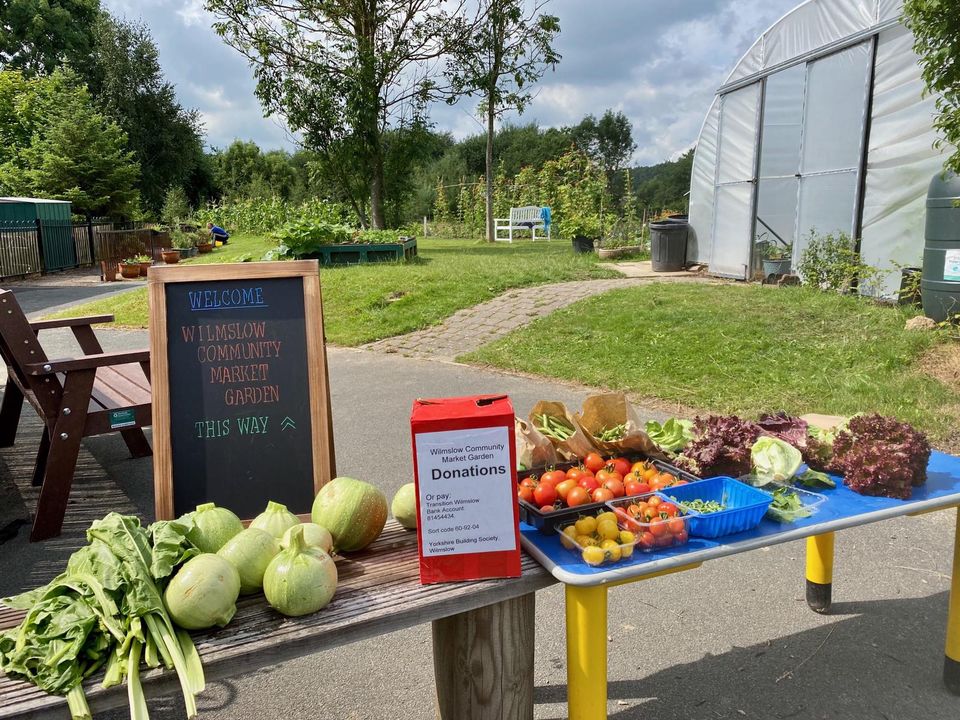
Community gardens can also open up the possibility for more people to ‘grow their own’, including those who don’t have gardens or land of their own. Where they are embedded in their community, the produce can be shared much wider than those directly growing it. Transition Wilmslow is working to set up a network of market gardens around their town and at one site, by a Children’s Centre in a housing estate, they run a community cafe which cooks up the harvest. Their gardens also supply local food banks with fresh veg.
Transition Town Forres’ 50 growers planted a little extra veg during Covid lockdown which was then distributed around the town. Their Green Shoots after schools club is back to teaching pupils to grow fresh, tasty veg which kids take home for their dinner, while the surplus goes to a local food bank.
“Growing food should be open to all and there are many projects working to tackle barriers and challenge notions as to who is a ‘typical gardener’. The Dig It Out campaign aims to work with gardening groups to help them challenge discrimination and campaign for positive change. New Transition Group IG3 plans to set up an urban Forest Garden and run a year-long hands-on permaculture course for people of colour. Mark Ridsdill-Smith of Vertical Veg is passionate about helping people grow food anywhere, whether on a doorstep or window sill.
The flipside of lack of land and local food is that sometimes there is simply too much of one crop, and it risks being dumped. Farmers are often beholden to advance supermarket orders and prices, which can be changed at the last minute, leaving fields of produce uneconomic to harvest. Gleaning volunteers pick the surplus food and ensure it is distributed to be eaten.
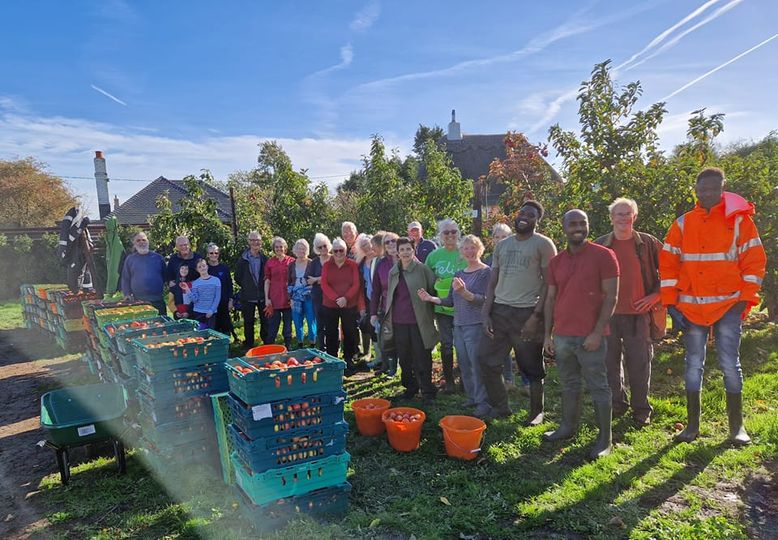
Neighbouring Transition groups Deal with It and Hythe Environmental Community Group team up to harvest surplus food at farms and orchards around their area. Between them, they’ve rescued more than 50 tonnes of food which is then distributed through local food charities. On a smaller scale, Transition Chesterfield and Reading each have a beautifully named Abundance project which operates in autumn and harvest particularly fruit from local trees and individuals’ gardens. Here’s the Gleaning Network’s map and handbook to get started.
Reimagining local food systems
Community initiatives are trying to address the harms of our existing food systems, but they are also trying to reimagine and rebuild our local food systems so they work better for people, producers and planets.
There isn’t space to do justice to the work of Transition groups to celebrate and highlight local food, to create new spaces for people and producers to connect, like the award winning local food markets set up by Transition Llambed in Wales and Crystal Palace Transition Town in London.
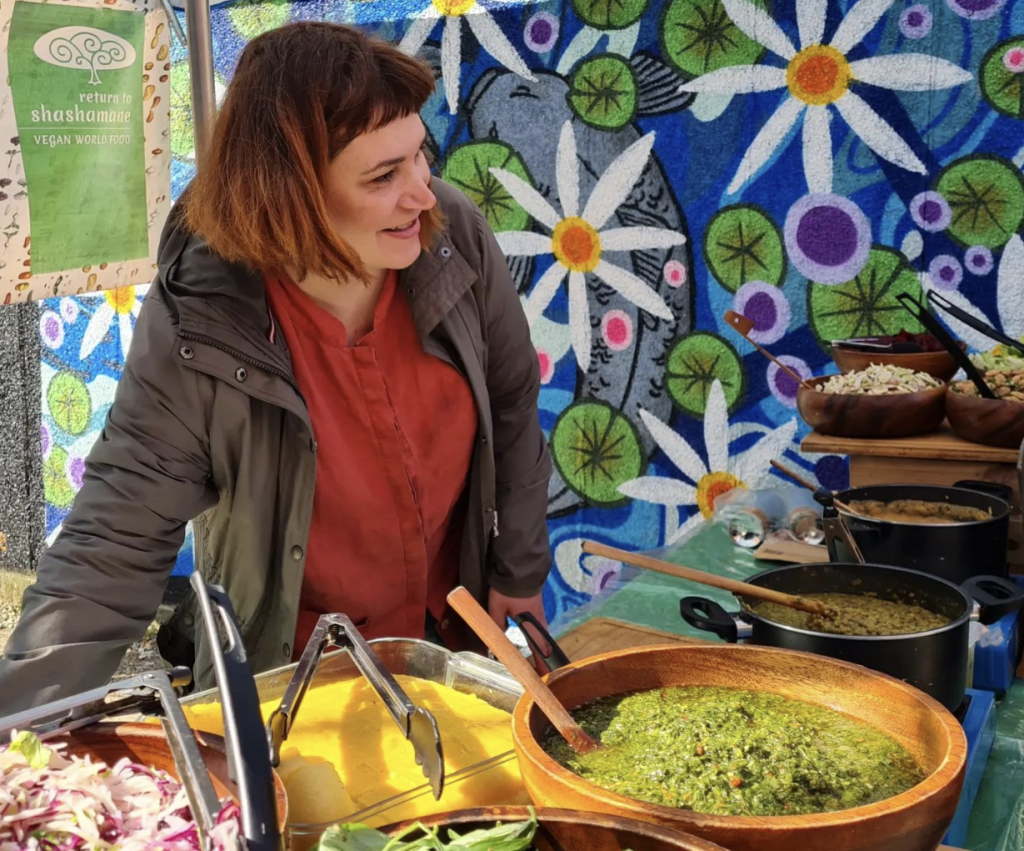
Nor how Transition food initiatives have given birth to veg box businesses, urban farms, community supported agriculture projects, local food co-ops and businesses.
We’ll have to come back for second helpings, because after all, it’s how we reinvent our food systems for the long term which dictates how resilient we are in times of crisis.
This is part of a series of articles on how communities are combating the cost of living crisis. Read our previous one on energy, and look out for the next in the series on community resilience.